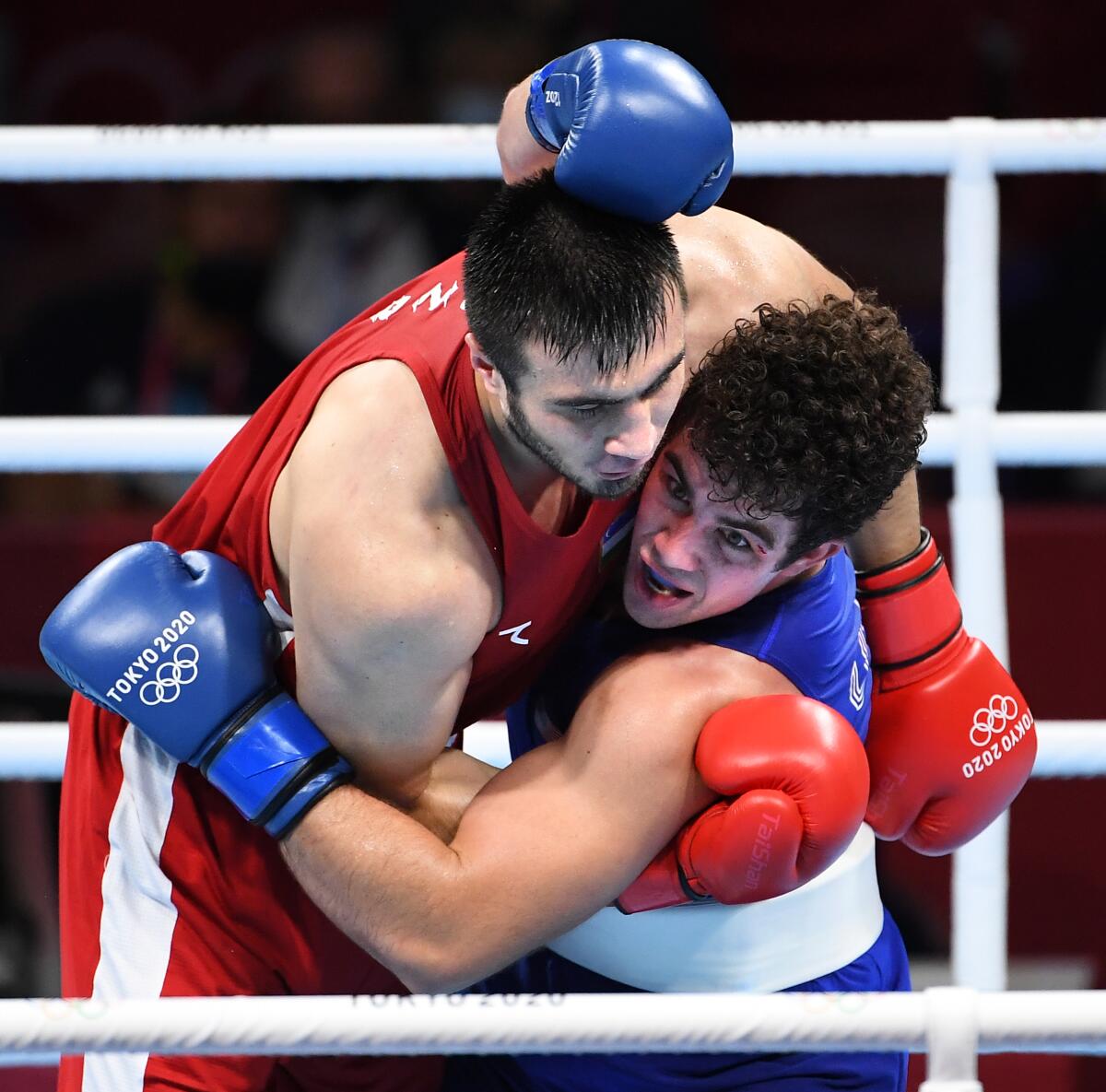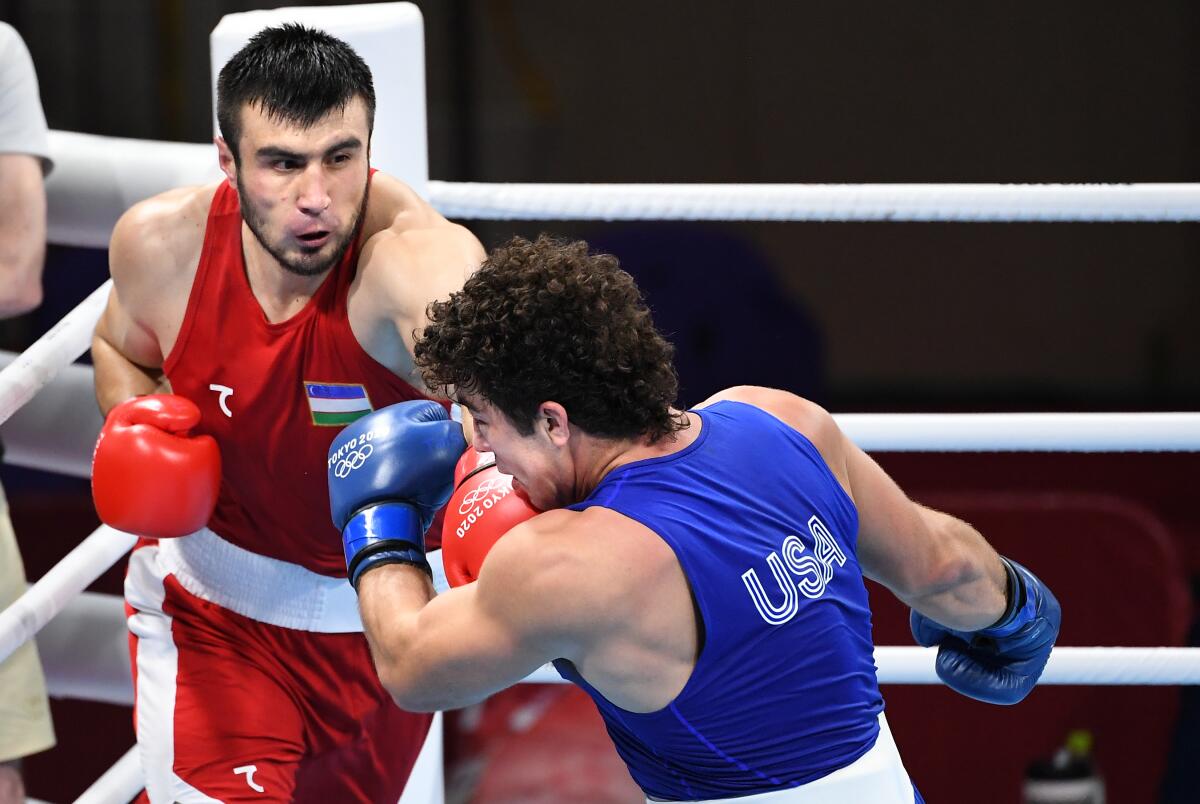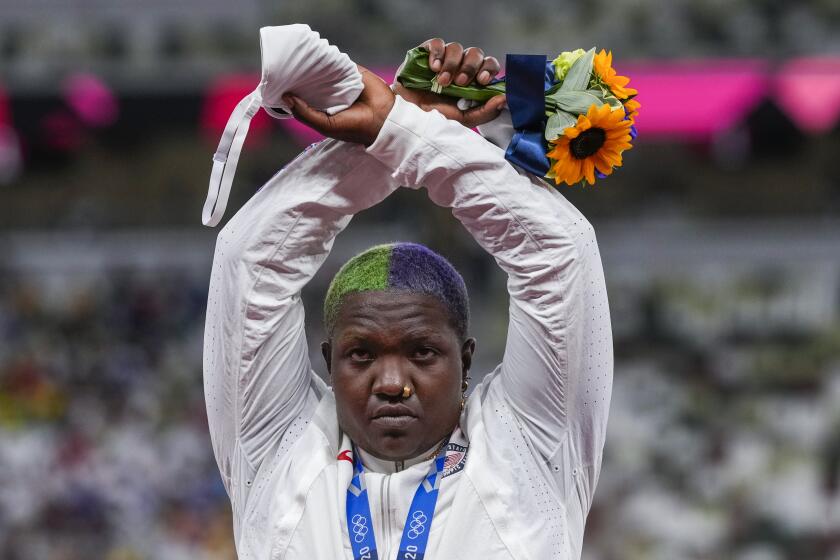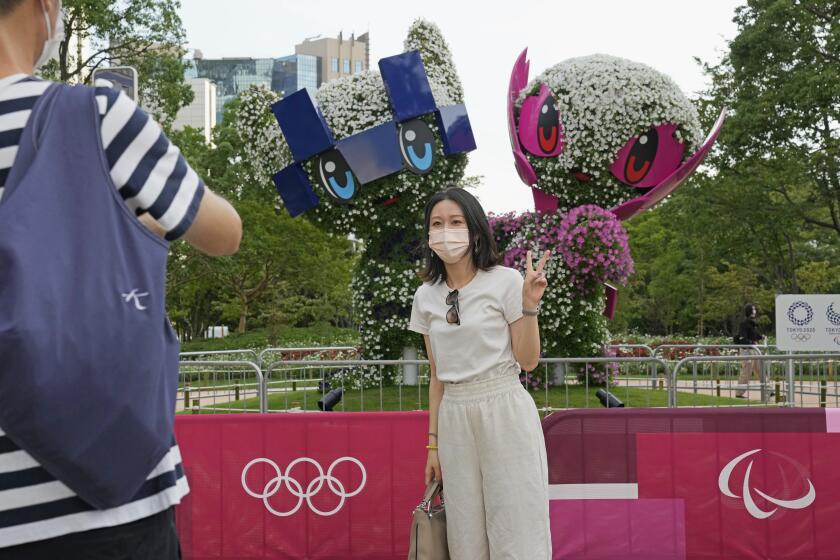U.S. earns biggest boxing medal haul in two decades, but gold remains elusive

- Share via
TOKYO — Keyshawn Davis watched the fight on television in a hallway adjacent to the ring inside historic Kokugikan Arena. He wore a white Team USA track suit, blue Nikes and a silver medal around his neck. It was the United States’ last chance at these Olympic Games for a gold medal, something it hadn’t gotten in men’s boxing since 2004.
But minutes after losing to Cuban Andy Cruz in the lightweight final, Davis transitioned from fighter to fan-slash-commentator for the super heavyweight gold-medal match.
He cheered with each punch Richard Torrez Jr. landed on Uzbekistan’s Bakhodir Jalolov, the man towering over him, and lauded his teammate’s courage. He lamented the point deduction given to Torrez in the second round, arguing that Jalolov deserved one for clinching too much.
“Richard is a dog,” Davis said. “Richard is a dog.”
After two rounds, Torrez — the Beethoven-loving, chess-playing underdog from Tulare — was even with the 6-foot-6 behemoth. Three minutes later, after a one-sided final round, the outcome was obvious enough that Davis didn’t argue.
With the Tokyo Olympics drawing to a close, there have been only a few, relatively mild demonstrations by athletes from the U.S. and other countries.
“I was going to joke around and say that [it felt] like David and Goliath,” Torrez, 22, said. “But at least David got his slingshot, right?”
As a result, the Americans will head into the 2024 Paris Games without a men’s Olympic boxing gold medal since Andre Ward struck gold in Athens 20 years earlier. The effort wasn’t a complete failure. The team won three silver medals — Duke Ragan also placed second in the men’s featherweight division — and Oshae Jones took bronze in the women’s welterweight class. It’s the country’s biggest boxing medal haul since 2000.
“I think, overall as a team, we are putting boxing back into the USA,” Torrez said. “I do think that we’re having a resurgence.”
Torrez’s loss, the final boxing match of the 2020 Olympics, was his first time in a ring with Jalolov since the Uzbekistani knocked him unconscious in the first round of the 2019 World Championships in Russia.
“It’s a big dude,” Torrez said.
That history wasn’t evident Sunday. The 6-foot-1 Torrez stood his ground. Facing a substantial reach disadvantage, he absorbed power punches — one gashed skin above his left eye and another wobbled him — operating inside but stayed on his feet. He won the first round.

Then he lost momentum. Torrez was deducted a point for dropping his head too much trying to move closer, a ruling he didn’t dispute afterward. He stopped moving his head. The fight drifted away. In the end, Jalolov’s size and power proved too much.
“I feel like I had the world in my hands, and it slipped and I watched it fall and break,” Torrez said. “And I’m trying to pick up the pieces.”
Jalolov roared when the final bell rang. He dropped to his knees when he was declared the winner. He walked out of the ring wrapped in his country’s flag, chants from two groups of fellow countrymen echoing through the historic sumo sanctuary. That he was allowed to fight in the Olympics at all was disputed in some corners of the boxing world.
These were the second Summer Games in which professional boxers were allowed to participate. In 2016, just three pros fought. None medaled. This time, at least 36 men and seven women with professional experience entered the ring. Davis (3-0 as a pro) and Ragan (4-0) were two of them. But Jalolov, a slugger unbeaten in eight professional fights, was the most imposing. Torrez, meanwhile, remains an amateur.
“The main problem is the Olympic dream is being tarnished because there is no equality, there is no opportunity,” World Boxing Council President Mauricio Sulaiman said. “When you have a good professional fighting against an amateur, there’s an absolute difference. And the idea of the Olympic Games in boxing has always been to develop the fighters.”
Sulaiman said the Olympics tried to persuade marquee professional fighters to participate in 2016. The list included Manny Pacquiao, a Filipino, and several high-profile Americans. All of them rejected the overtures.
Aggressive testing, tracking apps and restrictions prevented a widespread COVID-19 outbreak from derailing the Olympics, but there were problems.
The IOC stopped recognizing the International Boxing Assn. (AIBA) as the sport’s international governing body in 2019. The IOC, however, didn’t change the rule regarding professional status or the removal of headgear in men’s fights that AIBA imposed for 2016. Sulaiman said he hopes the IOC will reverse course on both fronts for Paris.
“You cannot play boxing,” Sulaiman said. “This is not about scoring goals or baskets.”
Torrez didn’t care for résumés or physical attributes. He stepped into the ring facing a disadvantage in seemingly every box, but he thought, if he stuck to his game plan, that he could win and supply the breakthrough for the American men.
He remained confident in the ring after three minutes. Davis did, too, from the hallway. Then the fight, the Americans’ last chance for three years, got away.
The first thing Torrez did when he left the ring was call his father, who reached the quarterfinals of the 1984 U.S. Olympic trials. Richard Sr. told his son he knew it sucked, but he was proud. He told him to keep his head up. That didn’t stop the tears.
“It’s a bad feeling, man,” Torrez Jr. said. “It’s a hurtful feeling. I hate this feeling right now.”
More to Read
Go beyond the scoreboard
Get the latest on L.A.'s teams in the daily Sports Report newsletter.
You may occasionally receive promotional content from the Los Angeles Times.









